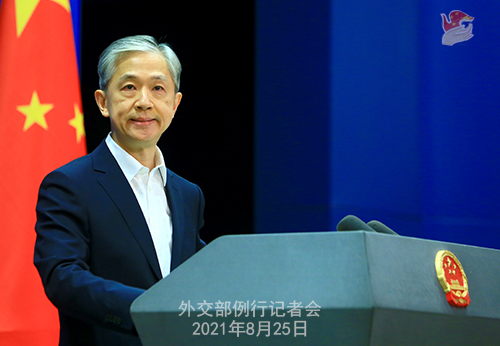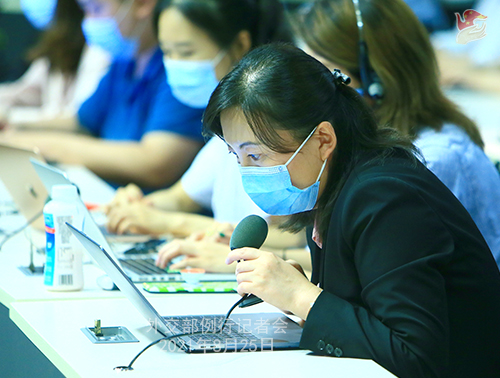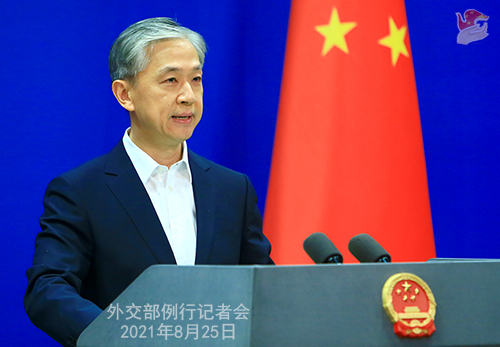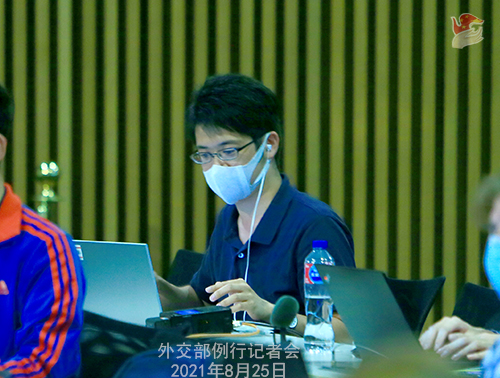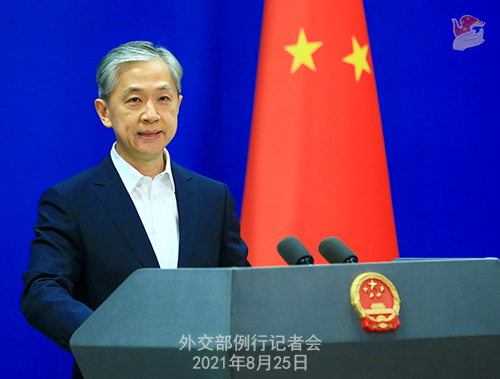| Foreign Ministry Spokesperson Wang Wenbin's Regular Press Conference on August 25, 2021 |
| 2021-08-25 19:52 |
|
Today, August 25, is the national low-carbon day. This week is the 31st National Energy Conservation Week under the theme of "saving energy and reducing carbon for green development". Raising the public awareness of ecological conservation, following through on the vision of green development, and making frugality and energy saving a common practice are important steps toward achieving low-carbon development, advancing ecological conservation and building a beautiful China. Hard work, thrift and simple living is a family heirloom of the Chinese nation. In the MFA, we carry forward our fine tradition of diligence and thrift. We actively practice the concept of low-carbon offices, take great effort to save energy and cut emissions, and advocate a green lifestyle. Today in Lanting, the AC is off, I'm not wearing a tie and there are video clips and e-posters on conserving water and protecting Earth on the electronic screen at the entrance. These are concrete measures of the foreign ministry's participation in the National Energy Conservation Week. Of course, they are only a small part of what the ministry has done. A clean, beautiful and green homeland is the shared dream of people in all countries. We hope you will join us in this effort by starting with small daily habits to reduce carbon footprint and raise environmental awareness. Let's play our part in looking after the planet we all call home and join hands in building a community of life for man and Nature. NTV: On August 24, Japan's self-defense force conducted a joint exercise with the US and the UK. The excise is believed to be targeting China and showing to the world the close ties between Japan, the US and the UK. Does the foreign ministry have any comment? Wang Wenbin: We noted relevant reports. China always holds that military cooperation between countries should not undermine regional peace and stability, or the interests of a third party. CCTV: It is learned that Permanent Representative of China to the UN Office at Geneva and other International Organizations in Switzerland wrote to the Director-General of the World Health Organization (WHO) the other day, handing over two non-papers on Fort Detrick and the University of North Carolina, as well as an open letter signed by netizens demanding an investigation into Fort Detrick. Could you please elaborate on China's position? Wang Wenbin: On August 24, Ambassador Chen Xu, Permanent Representative of China to the UN Office at Geneva and other International Organizations in Switzerland, wrote to WHO Director-General Tedros Adhanom Ghebreyesus, and submitted two non-papers titled "Doubtful Points about Fort Detrick (USAMRIID)" and "Coronavirus Research Conducted by Dr. Ralph Baric's Team at University of North Carolina", and an open letter signed by more than 25 million Internet users calling for an investigation into the Fort Detrick base. China's position on the issue of global origins study is consistent and clear. Tracing the origins of the virus is a scientific issue. China always supports and will continue to participate in scientific origins study. The conclusions and recommendations of the China-WHO joint study report have been recognized by the international community and the scientific community, and must be respected and implemented. Future global origins study should and can only be carried out on this basis. The Wuhan Institute of Virology (WIV) has received WHO experts twice. It is extremely unlikely that the novel coronavirus was leaked from the WIV -- this is the clear conclusion of the China-WHO joint study report. Those who insist that the possibility of a lab-leak cannot be ruled out should investigate Fort Detrick and the University of North Carolina in the principle of fairness and justice. The fact is, the international community and the American people have long raised serious concerns over the illegal, non-transparent and unsafe practices at the Fort Detrick base. It is the center of US bio-military activities and USAMRIID is the main research entity there. USAMRIID has long been engaged in coronavirus research and modification. After the Institute was shut down because of serious safety incidents in 2019, disease with symptoms similar to that of COVID-19 broke out in the US. The US has not yet given any explanation on these problems to the international community and American people. As to the University of North Carolina, the US has been falsely accusing the WIV of causing the COVID-19 pandemic with its coronavirus researches. However, it is the US who has sponsored and carried out more such researches than any other country. In particular, the Baric team leads the world in researches in this field, with extremely mature capability in synthesizing and modifying coronavirus. An investigation into Dr. Baric's team and lab will help clarify whether such researches have created or can create SARS-CoV-2. We urge the US to stop using the origins study to seek political manipulation. If it is bent on insisting the lab-leak theory, it should start with inviting WHO experts to launch a probe into Fort Detrick and the University of North Carolina to find the source of the virus. In the meantime, we hope the international community can work hand in hand to resist the backlash of politicization and bring the origins study back to the right track of scientific cooperation.
Xinhua News Agency: China announced on August 24 that it will work together with African countries to formulate and implement a plan for China-Africa digital innovation partnership. Could you talk about the two sides' expectations for advancing cooperation in digital innovation? Wang Wenbin: Digital innovation is an emerging sector for practical cooperation between China and Africa. State Councilor and Foreign Minister Wang Yi said during his trip to Africa at the beginning of this year that China will strengthen digital cooperation with the African side and help it seize the opportunity presented by the information revolution, bridge the digital divide and build a digital Africa. To advance new progress in the digital technology and to inject new impetus into high quality China-Africa cooperation, Assistant Foreign Minister Deng Li announced at yesterday's opening ceremony of the China-Africa Internet Development and Cooperation Forum that China stands ready to work together with African countries to formulate and implement a plan for China-Africa digital innovation partnership. He also proposed efforts in six aspects. First, strengthen digital infrastructure to ensure unimpeded information flow for socioeconomic development. Second, nurture the digital economy and promote the integrated development of the digital technology and the real economy. Third, advance digital education to produce a talent pool for digital innovation and thus remove the bottleneck. Fourth, enhance digital inclusiveness to make sure services benefit all African people. Fifth, jointly ensure digital security and improve digital governance capability. Sixth, build cooperation platforms to stimulate progress with exchange. Actions speak louder than words. As China announced the partnership plan, relevant commitments have already begun to translate into reality. Some optic fiber backbone projects undertaken with China-Africa cooperation will soon start in Africa. Starting from September, there will be a season of promotion through e-commerce for African products and the China-Africa Beidou Cooperation Forum, among other events. We will maintain communication with the African side to jointly design practical cooperation measures in the digital area for the coming three years and include them in the list of deliverables of the FOCAC meeting to be held at the end of the year to bring China-Africa digital cooperation to a new height. Reuters: According to a Reuters report, US climate envoy John Kerry is expected to travel to China in September. Can you confirm if he will be visiting and if so, what the visit will entail? Wang Wenbin: I don't have any information to offer at the moment.
Global Times: It is reported that according to US officials, the US intelligence report on the origins of COVID-19 is not likely to "yield a definitive conclusion on whether the new coronavirus jumped to humans naturally, or via a lab leak, in part because of the lack of the detailed information from China". Does the foreign ministry have any comment? Wang Wenbin: The US government draws on the intelligence apparatus to publish the so-called report on origins tracing. Its aim is not to get to the bottom of the origins of the virus, or to form a scientific report based on facts and scientific methods. What the US is really up to is to shift the responsibility of its failure in pandemic response domestically and scapegoat China. Such a politicized report to plant evidence, naturally will not reach any scientific conclusion on origins tracing of COVID-19, but will only interfere in and undermine the global efforts of origins tracing and cooperation on pandemic response. The allegation of lack of information from China is just an excuse to cover up the US' own failure in relying on intelligence to trace the origins of the virus. I want to tell the US side that Chinese and WHO experts have released a joint origins study report, which contains abundant authoritative and valuable information. The US is the country with the highest number of infections and deaths in the world, and the worst outward spread of the virus. The timeline of the COVID-19 outbreak in the US has been constantly revised to earlier dates, with the connection between Fort Detrick and the University of North Carolina biological laboratories and the novel coronavirus shrouded by suspicions. The international community strongly asks the US side to be open and transparent and provide detailed information on this. The US side has been dodging these questions. It remains reticent and puts up obstacles. This only shows that the US has a guilty conscience. What it cares about is not how to find the origins of the virus, but how to use the issue to suppress other countries and serve its own interests. SCMP: A spokesman for the Political Office of the Taliban in Qatari capital Doha tweeted on August 24 that the Taliban delegation met with Chinese ambassador and others in Kabul. Do you have more information on that? Wang Wenbin: China and the Afghan Taliban have smooth and effective communication and consultation. Kabul is naturally an important platform and channel for the two sides to discuss various important matters. I want to stress that China's policy toward Afghanistan is consistent and clear. We always respect the sovereignty, independence and territorial integrity of Afghanistan, follow the principle of non-interference in Afghanistan's internal affairs and adhere to a friendly policy toward the entire Afghan people. China respects the Afghan people's independent choice of their own future, supports the implementation of the "Afghan-led and Afghan-owned" principle, and stands ready to continue to develop good-neighborliness, friendship and cooperation with Afghanistan and play a constructive role in Afghanistan's peace and reconstruction. Bloomberg: The ruling parties of Japan and Taiwan will hold their first security talks this week. The bilateral concerns about increasing Chinese military strength will likely to be atop the agenda. Does the Foreign Ministry have a comment? Wang Wenbin: I noted relevant reports. Taiwan is an inalienable part of China's territory. China firmly opposes all forms of official interactions between Taiwan and countries having diplomatic ties with China. The Taiwan question concerns the political foundation of China-Japan relations. On the Taiwan question, the Japanese side bears historical responsibilities to the Chinese people for its past crimes and should especially be prudent with its words and actions. We seriously urge Japan to review its considerations, avoid interfering in China's domestic affairs in any form, and refrain from sending wrong signals to "Taiwan independence" forces in any form.
Shenzhen TV: Foreign media reported that on August 24, the head of US Space Command James Dickinson in his speech at the 36th Space Symposium of the Space Foundation claimed that, the warfighting force he leads has reached Initial Operational Capability, and will achieve full operational capability in the next several years. He also mentioned that the US Space Command soon will begin conducting its own military exercises focused on space warfighting. Do you have any comment? Wang Wenbin: Currently, space security is getting increasingly complicated and severe, with the US being the primary factor that has an impact on space security. In recent years, the US has openly defined space as a new warfighting domain, put in place an independent space force and space command, and vigorously built up space military strength. What the US has done exacerbates the risks of weaponizing space and turning it into a war-fighting domain, and severely threatens peace and tranquility of space. In this regard, China is deeply concerned. China stands for peaceful use of space, and advocates preventing weaponization of and arms race in space. Over the years, China has worked with countries including Russia, to actively push the international community to negotiate legal instruments on space arms control, so as to safeguard security and ensure sustainable utilization of space. What stands in contrast is that the US, for a long time, resists negotiation process on space arms control, and divert the attention of the international community by painting China as a threat in space. The acts of the US side show that weaponizing space and turning it into a war-fighting domain has become the biggest threat to space security, and that it is of much urgency to negotiate and conclude legal instruments on space arms control. China hopes that the US will earnestly shoulder its due responsibility as a major country, and do more to safeguard peace and security in space. China calls upon the international community to attach importance to the risks of space arms race, and actively participate in and support the negotiations on legal instruments on space arms race. Reuters: First, US Vice President Harris has offered Vietnam support to counter China in the South China Sea, including more visits by US warships. Do you have any comment on that? And second, according to a report from Bloomberg, a group of US financial firms and Chinese regulators are trying to restart meetings later this year. Do you have any comment on this? Wang Wenbin: On your first question, the US has so far refused to accede to the United Nations Convention on the Law of the Sea, while claiming to uphold it. The US arbitrarily launched military intervention in Afghanistan, Iraq and Syria, while claiming to defend the interests of smaller countries. I think it would be much more credible if the US said it was trying to maintain its hegemony and uphold its own interests. China is firmly opposed to the US deployment of maritime law enforcement forces in the South China Sea to meddle in regional affairs and disturb regional peace and stability. On your second question, I am not aware of relevant situation. You may refer to competent authorities.
|
| |||||||||||||||
|
|||||||||||||||


